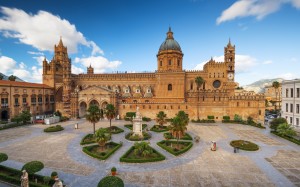Low-cost airline easyJet is to expand its fleet of aircraft based at Bristol Airport next year in a move that will enable it to launch two new routes to Mediterranean hotspots.
The airline, already Bristol’s largest operator accounting for more than half its destinations, will introduce a 19th plane to the airport in June.
The A320neo (new engine option) aircraft, pictured, will allow it to start a new year-round service to Almeria in southern Spain and Palermo on Sicily.
Both are new destinations from Bristol and take the number of Spanish cities served by scheduled flights from the airport to 13 and nine in Italy.
The twice-weekly (Tuesdays and Saturdays) service to Almeria, pictured below, will launch on 24 June, adding to easyJet’s existing flights to the city from Stansted, Luton and Southend.
The link to Palermo, pictured below, will launch two days later and also operate twice weekly – on Thursdays and Sundays. EasyJet already links to the Sicilian capital from Gatwick and Luton.
The airline said the expansion of its Bristol fleet would deliver a boost to the region, with each aircraft supporting around 400 direct and indirect jobs and adding £27m to the economy.
It also said as the two new routes were established sunshine destinations, their launch would allow its tour operator arm easyJet Holidays to bolster its package break.
Since launching operations at Bristol in May 2001, easyJet has carried a total of more than 76m passengers.
Adding the two new routes means it now flies to 83 destinations in 19 countries from Bristol. The airport in total serves 117 destinations in 34 countries.
EasyJet added its 18th Bristol-based aircraft this summer, which allowed it to introduce twice-weekly services to Istanbul, Agadir in Morocco and Tromso, Norway.
Two of these destinations had not previously been accessible by direct flights from Bristol – with easyJet going head-to-head against rival Jet2 on the Agadir route.
EasyJet, which operates an all-Airbus fleet, said using new 186-seat A320neo aircraft brought environmental and operational efficiencies compared to its current generation of A320s, resulting in at least 15% less CO2 emissions and 50% less noise during take-off and landing.
The A320neo aircraft family, featuring fuel-efficient wingtip ‘sharklets’, has become a workhorse of the budget airline sector, along with Boeing’s 737-MAX 8200, which is used by rival Ryanair. 
EasyJet UK country manager Ali Gayward, pictured, said: “Our success in Bristol is a testament to the continued popularity of our flights and holidays, with customers choosing us for our trusted brand, unrivalled network and great value fares.
“The growth of our fleet with an additional aircraft will not only support around 400 jobs but is enabling us to further unlock the opportunity of the continuing demand that we see for both leisure and business travel in the South West.
“We’re already capturing this opportunity with the launch of new routes next summer, which will provide more customers with greater choice and connectivity, and we look forward to welcoming them on board.”
Bristol Airport commercial director Rupert Lawrie added: “It’s great news that easyJet continues to invest in Bristol Airport and will be basing 19 aircraft here.
“The new connection to Palermo and all-year route to Almeria adds even more choice for customers and opens opportunities for people from these countries to also visit the South West.
“We’re pleased that the new aircraft will be an Airbus A320neo. This underpins our commitment to local communities that we are actively encouraging airlines to base their newer, quieter and more fuel-efficient aircraft here at Bristol Airport.”
Last month Bristol Airport unveiled a new masterplan to increase its capacity from 12m passengers a year to 15m while adding direct flights to the East Coast of America and the Middle East.
Airport bosses insist current restrictions on passenger numbers – set just two years ago – are too low and can be sustainably increased by 3m a year until around 2036 as demand for air travel continues to rise.
The airport, which is owned by Canadian group Ontario Teachers’ Pension Plan, is currently undergoing a £400m expansion to upgrade its terminal building, increase parking and public transport links and create two new executive lounges and 38 new or upgraded catering and retail outlets.






























